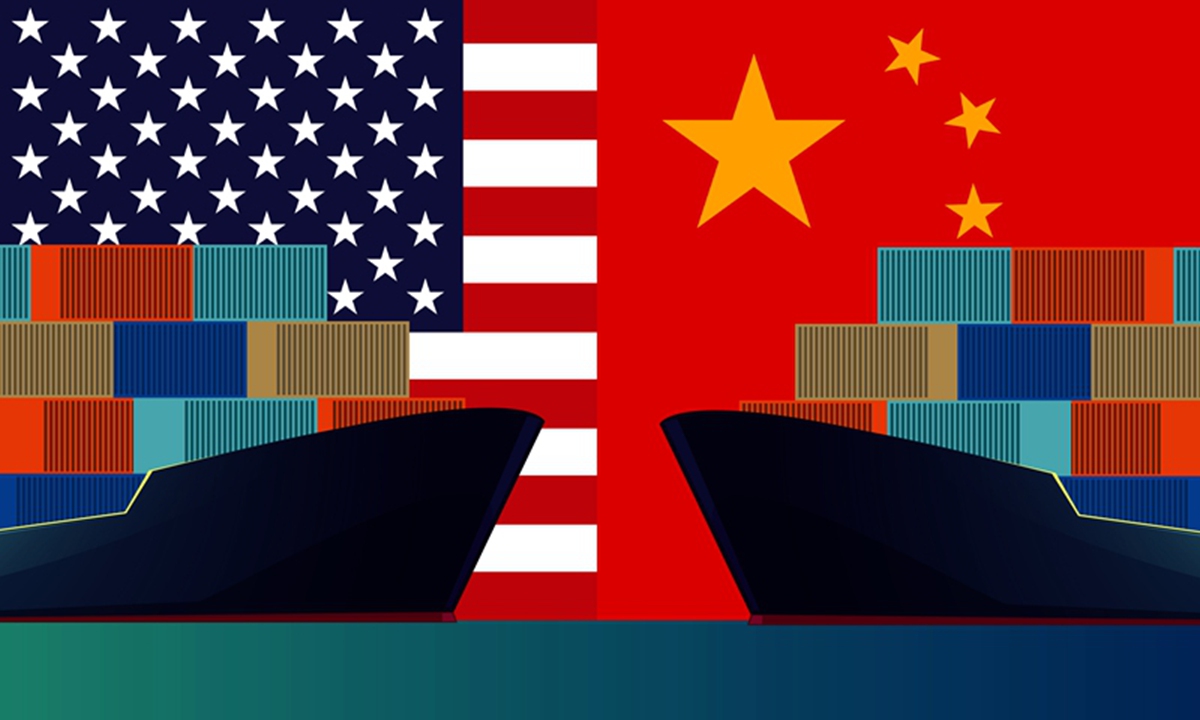
China US Photo: GT
Despite the impact of the coronavirus pandemic and lingering tensions between China and the US, nearly 60 percent of US-based enterprises which are members of AmCham China, aim to increase their investment in China, and more than 85 percent of the US companies said that they are not considering moving out of China, a white paper issued by the chamber said on Tuesday.
Amid the downward trend of the two countries' relations, the chamber urged both the Chinese and US governments to avoid a "decoupling", as it is not in line with the interests of the businesses in the two countries.
In its 2021 American Business in China White Paper, released on Tuesday, the chamber said that the numbers indicate that China's business environment has seen a persistent improvement.
"With respect to perceptions of China's investment climate, our members continued to display optimism in 2020, as 50 percent of members reported that the investment environment was improving," read the paper.
"Nearly two-thirds of members report they are planning to increase investment in China in 2021, with the majority expecting to increase investment by between 1 and 10 percent," the paper said.
On Tuesday, Hua Chunying, spokesperson of China's Foreign Ministry, said that China welcomes all to supply qualified products, and that it treats all countries and companies equally when making government purchases.
"China has never imposed restrictions on any specific countries or companies," Hua said. "Unlike some other countries, China never abuses the idea of national security in order to discriminate against others for protectionist purposes."
"These numbers objectively reflect China's efforts and determination to improve the country's business environment," Tian Yun, vice director of the Beijing Economic Operation Association, told the Global Times on Tuesday.
China has been pushing to improve its business climate in recent years, and the fact that China became the largest foreign direct investment recipient in 2020 proved it, Tian noted.
However, despite the improvement of the business climate, there are still some challenges, including the pandemic and the deteriorating bilateral ties, which create huge uncertainties for businesses from both sides, said Greg Gilligan, chairman of AmCham China, on Tuesday.
"In 2020, we witnessed a continued deterioration of US-China relations in almost all respects... Exchanges between both sides were characterized by a deep mistrust and the rhetoric continued to be unproductive and inflammatory. This has created a great degree of uncertainty for the business community," the chamber said in the paper.
"This (deteriorating ties) has created an exceptionally challenging year for the American business community... We did see progress, of course, with the phase one (trade) agreement," Lester Ross, chairman of AmCham China's policy committee, said on Tuesday.
But the signed phase one trade deal and US Trade Representative Katherine Chi Tai's recent willingness to have talks with Chinese Vice Premier Liu He, who led China's negotiations for the phase one deal, seem to have given some hope to the chamber's members.
In his first foreign policy address on February 4, US President Joe Biden described China as the "most serious competitor" to the US and vowed to "confront" Beijing on various fronts.
In response to a question from the Global Times about the chamber's perspectives on China-US cooperation under the Biden administration, Gilligan said that it's hard to predict, as several important positions are still unfilled.
But he said that the Biden administration seems to be taking a multilateral approach that uses input from a lot of different places. such as the business sector.
"The next four years will be somewhat different than the previous four years," he said.
"The ball to improve bilateral ties is in the US' court," Tian said, adding that China has done the best in fighting the pandemic, which has provided a good condition for global businesses to operate in the market. It is the US that is creating uncertainties for bilateral ties.
Despite the challenges ahead, Gilligan and Ross both believed that China-US cooperation will continue, as a "decoupling" of the two economies would severely harm business interests and it will hurt the interests of the US economy.
"We hope the US government will recognize how important it is for US businesses to succeed in China," Ross said, adding that "it's just inconsistent with the interests of our members, and the interests of the US economy."
"Business executives are more realistic and pragmatic, as they know what is in their true interests, and their voices -- in line with increasing China-US trade -- have shown that decoupling is a political stunt," Tian added.




